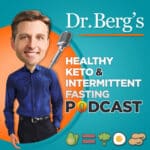*****
Summary of Transcript:
The LDL cholesterol measurement used by doctors is an estimate known as the freedwall equation and becomes more inaccurate the more metabolically unhealthy you are. Apolipoprotein B (APOB), a protein on atherogenic lipoprotein particles, is a more accurate indicator of cardiovascular risk than total cholesterol or LDL cholesterol. APOB indicates the concentration of lipoproteins in the blood, which is important because the more insulin resistant a person is, the more triglyceride-enriched their lipoproteins get, causing LDL cholesterol to not directly correlate with risk. Oxidation is a key initiation process in the development of atherosclerosis. It is important to maintain a metabolically healthy diet and lifestyle, avoid consuming highly oxidizable seed oils, and measure APOB levels to accurately assess cardiovascular risk. Doctors should focus more on APOB levels than just LDL cholesterol.
*****
Summary of Description:
Recent research suggests that using the ApoB to ApoA1 ratio and lipoprotein particle analysis provide a more accurate assessment of cardiometabolic disease risk than just measuring LDL-cholesterol levels. Optimal ApoB levels are under 60, and biomarkers of oxidative stress can also be used to assess risk. Many people who die from heart disease have normal or low LDL levels, so it is important to look at biomarker patterns. Atherogenic cholesterol is produced by the liver, and it is important to prevent oxidation and avoid ingesting oxidized seed oils. Triglycerides can skew LDL measures.
*****
Why the ApoB to ApoA1 Ratio is a Better Predictor of Cardiometabolic Disease Risk Than LDL-Cholesterol Testing
Standard LDL cholesterol measurements have long been used as a marker for heart disease risk, but emerging data suggests that using the ApoB to ApoA1 ratio and lipoprotein particle analysis can more accurately assess cardiometabolic disease risk. In this article, we dive into the science behind this claim and discuss how you can support your intermittent fasting lifestyle with the Berberine Fasting Accelerator by MYOXCIENCE.
The Role of Apolipoproteins in Atherosclerosis
Every atherogenic lipoprotein has one ApoB100, which is causally related to atherosclerosis. Optimal ApoB levels are under 60, and it is the ratio of ApoB to ApoA1 that can provide a more accurate predictor of risk. LDL measurements, on the other hand, do not always correlate with risk as many people who die of heart disease have low or normal LDL cholesterol.
Biomarkers of oxidative stress are also linked to the risk of atherosclerosis, so focusing on ApoB levels and the ApoB to ApoA1 ratio can provide a more comprehensive understanding of an individual’s risk. By looking for biomarker patterns, such as elevated triglycerides and low HDL, you can get a clearer picture of your risk of heart disease.
Preventing Oxidation for Heart Health
It is important to note that atherogenic cholesterol is made by your liver, and preventing oxidation is key to protecting your heart. This means avoiding ingesting oxidized seed oils and focusing on antioxidant-rich whole foods.
Support Your Intermittent Fasting Lifestyle with Berberine Fasting Accelerator
If you are following an intermittent fasting lifestyle, the Berberine Fasting Accelerator by MYOXCIENCE can provide additional support. This supplement contains Berberine, a natural compound that can help improve insulin sensitivity and reduce blood sugar levels, both of which are important for cardiometabolic health.
In addition, the Berberine Fasting Accelerator also contains several other ingredients, like alpha-lipoic acid and milk thistle, that can further support liver health and protect against oxidative stress. By using this supplement in conjunction with a healthy diet and lifestyle, you can optimize your heart health and reduce your risk of cardiometabolic disease.
Don’t Rely on Standard LDL-Cholesterol Testing Alone
In summary, standard LDL cholesterol measurements are estimates and may not accurately predict your risk of heart disease. Instead, focus on ApoB levels and the ApoB to ApoA1 ratio, as well as other biomarker patterns, to get a more accurate picture of your risk. And to support your intermittent fasting lifestyle, consider the Berberine Fasting Accelerator by MYOXCIENCE as a natural supplement that can help optimize your cardiometabolic health.
*****
See Original Source
Source Description
Emerging data suggests using the very affordable ApoB to ApoA1 ratio as well as lipoprotein particle analysis more accurately assess cardiometabolic disease risk than just LDL-cholesterol testing.
Support your Intermittent Fasting lifestyle with the Berberine Fasting Accelerator by MYOXCIENCE: https://bit.ly/berberine-fasting-accelerator
Use code podcast to save 12%
Get the Blood Work Cheat Sheet: https://courses.highintensityhealth.com/blood-work-cheat-sheet
Link to studies: Posting soon…
————-Sleep & Camera Tools You NEED!———————–
Eat like your life depends it Tee Shirt!: https://bit.ly/3dEHM3e
Best Sleep Mask: http://bit.ly/2AIVbDV
Blue Blocking Glasses: http://bit.ly/blueblox
Best Mouth Tape (Nexcare): https://amzn.to/31qJayh
NeilMed Nasal Wash Kit https://amzn.to/3EUQaYE
Breath Right Strips: https://amzn.to/31t5VSl
A Metabolism Book Should Have:https://amzn.to/2jUiAh5
—————————————–Show Notes————————————–
0:00 Intro
0:03 Standard LDL cholesterol measurements are estimates.
0:15 Every atherogenic lipoprotein has one ApoB100.
1:10 ApoB is causally related to atherosclerosis.
2:08 Optimal ApoB is under 60.
4:05 LDL measurements do not correlate to risk.
6:40 Biomarkers of oxidative stress are linked with risk of atherosclerosis.
7:30 Focus on ApoB levels and the ratio or ApoB to apoA1.
8:50 Many people who die of heart disease have low or normal LDL cholesterol.
10:15 Look for biomarker patterns.
11:30 Atherogenic cholesterol is made by your liver.
12:43 Prevent oxidation and do not ingest oxidated seed oils.
15:30 Triglycerides skew LDL measures.


Comments are closed